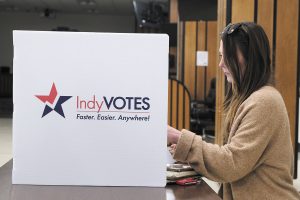Subscriber Benefit
As a subscriber you can listen to articles at work, in the car, or while you work out. Subscribe NowVoting rights advocates critical of a controversial new Indiana voter registration law expect legal challenges to the measure that supporters tout as another way to tighten up election security and deter voter fraud.
Rep. Tim Wesco, R-Osceola, authored House Enrolled Act 1264, which went into effect July 1.
Wesco did not respond to repeated requests through his spokesperson for comment.
Under the law, residents who are first-time voters in Indiana would have to provide proof of residency when registering in person unless they submit an Indiana driver’s license or Social Security number that matches an Indiana record, according to The Associated Press.
The new law also allows the state to contract with third-party vendors who supply credit data, which would be cross-referenced with voter registration records to identify possible residence changes and any voters registered at non-residential addresses.
It requires the state to compare voter registration to Bureau of Motor Vehicles data on credentials given to noncitizens.

WFYI reported that people flagged by that comparison would have to show proof of citizenship to their county election officials within 30 days in order to be able to vote.
The citizenship provision of the bill goes into effect July 1, 2025.
Chris Daley, the American Civil Liberties Union of Indiana’s executive director, said the ACLU’s primary concern is that Indiana continues to be one of the worst states in the country in terms of voter registration and voting numbers.
The Indiana Civic Health Index, released in January, painted a bleak picture for Indiana voter participation compared to other states.
The index’s sixth edition showed Indiana ranked 50th nationally in voter turnout in the 2022 midterm elections, with a 41.9% rate, and 40th in voter registration.
That voter turnout rate represented a 7.4% decline from 2018.
In 2012, Indiana ranked 36th in voter turnout, but by 2020, the state’s rank in presidential election years fell to 46th.
The state’s voter registration ranking has consistently fallen between 2010 and 2022, according to the report, with its most recent rank of 40th at 66.5%.

in person unless they submit an Indiana driver’s license or Social Security number that matches an Indiana record.
(IL file photo)
Daley said anything that makes it more difficult to vote, like HEA 1264, raises a lot of concerns for the ACLU.
“What we know is when we purge voter rolls, there are typically errors made,” Daley said.
Daley said there’s something about Indiana’s process of engaging with voters that is keeping the state’s registration ranking and voting percentages among the lowest in the country,
New law’s requirements
The law also requires officials to cross-reference the state’s voter registration system with data from the Indiana Bureau of Motor Vehicles.
At a Jan. 10 House Elections and Apportionment Committee hearing, Brad King, Republican co-director of the bipartisan Indiana Election Division, told the committee he supported the bill and what he called its overall theme of election security.
“We’re always looking at new methods to make sure the voter rolls are accurate,” King said at that hearing.
But Matthew Kochevar, Democratic co-general counsel at the election division, noted to the committee in his testimony that current law already forbids noncitizens from registering to vote.

Hans von Spakovsky, Senior Legal Fellow in The Heritage Foundation’s Edwin Meese III Center for Legal and Judicial Studies, supports the new Indiana law.
Former President Donald Trump appointed von Spakovsky, a former member of the Federal Election Commission to the Presidential Advisory Commission on Election Integrity in 2017.
He said he didn’t understand why any BMV would be allowing noncitizens to register to vote, as it’s against the law.
“To me, that is a major problem,” von Spakovsky said.
He said it seemed obvious to him that any BMV would be checking to verify credentials.
Von Spakovsky said there were several examples of incidents of voter fraud around the country. He said he served on a county election board in Virginia where, when comparing county voter registration records with BMV records, the board found 300 individuals who shouldn’t be allowed to register.
“They clearly were not U.S. citizens when they registered,” he said.
The Help America Vote Act of 2002 required states to check BMV records anyway and requires a statewide voter registration system, he said.

Julia Vaughn, executive director of Common Cause Indiana, said she has a number of reasons for opposing HEA 1264.
Vaughn said Indiana does not have a problem with noncitizens voting in its elections and the state’s Bureau of Motor Vehicles hasn’t reported any issues with fraud.
“We suggested, if that’s the problem, why not start there,” Vaughn said, referring to the BMV.
Vaughn said immigration attorneys have talked about how difficult it is to prove citizenship.
She said Common Cause also questions the constitutionality of the HEA 1264, emphasizing that laws can’t treat one type of voter differently than another.
The law will affect college students and people without traditional residences, Vaughn said.
“It’s a solution in search of a problem,” Vaughn said, calling the law “motivated by myths and misconceptions.”
Like Daley, Vaughn said the law could potentially create another impediment to voter registration, something Indiana doesn’t need in light of its low voting numbers.
Vaughn said Common Cause and other voting rights advocates would have liked to challenge the bill immediately in court but are weighing their options.
“We’d like to do it sooner rather than later,” Vaughn said.•
Please enable JavaScript to view this content.
